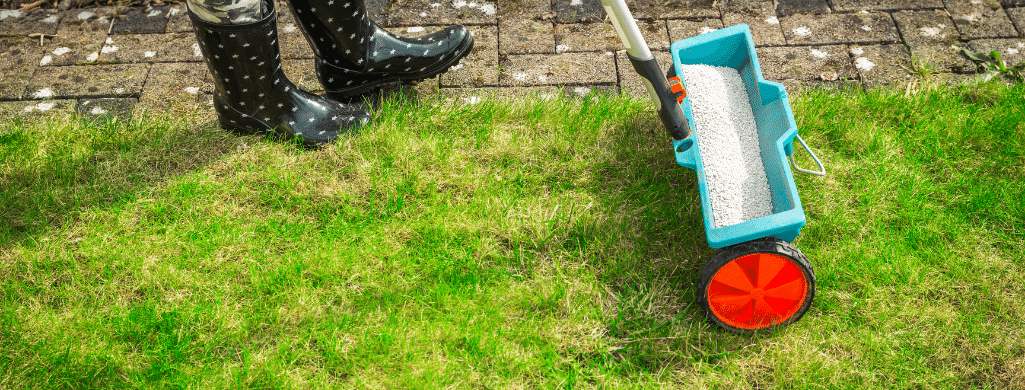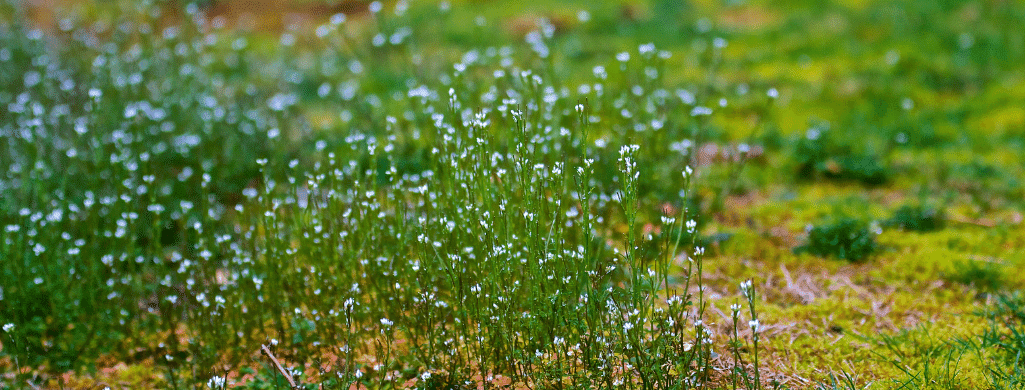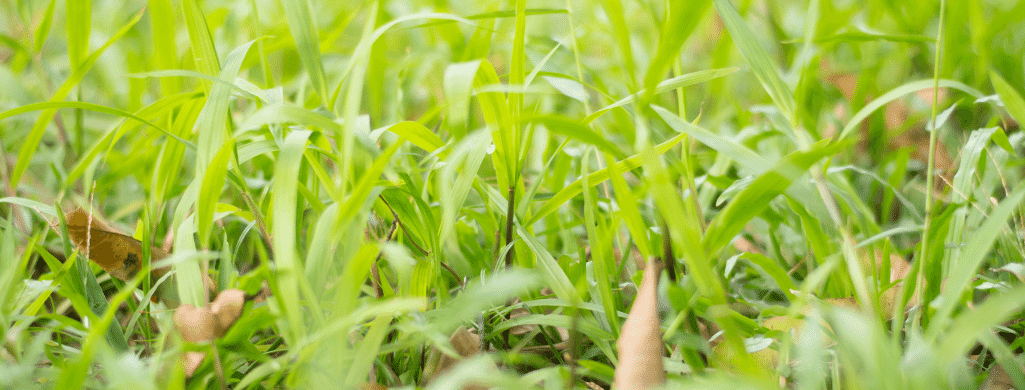Preen is a pre-emergent herbicide used to control several common types of broadleaf weeds.
Since Preen does not contain glyphosate as an active ingredient, it is considered safer to use than other products, such as Roundup.
Preen has been proven to be one of the most effective weed preventers available.
But is it safe to use Preen on grass?
Preen is generally safe to use on healthy, established lawns if used as directed. Because Preen is a pre-emergent herbicide, it will not kill grass on direct contact. However, Preen may inhibit the ability of grass to absorb nutrients, leading to slower growth.
It is advised to wait at least four months before applying Preen in areas of your lawn with newly-planted grass seeds.
Applying Preen too soon after seeding your lawn will kill your grass seeds before they begin germinating.
Keep reading to learn how Preen works and how to safely apply it to your lawn to prevent weeds.

Table of Contents
How Does Preen Work?
The Preen Lawn Weed Control product is a pre-emergent weed killer that prevents seeds from germinating and suppressing weed growth.
When Preen is applied to the soil, it creates a weed-killing barrier.
If any weed seeds do begin to sprout, they will die when they reach the layer of Preen in the soil.
This weed-killer barrier remains active in the soil for 8-12 weeks before another application of Preen is necessary.
Preen controls common broadleaf lawn weeds such as knotweed, plantain, clover, chickweed, and dandelion.
While it is not as effective against grassy weeds, Preen may still cause damage to lawn grass if used incorrectly.
Always follow the directions for the application rate on the product label of any herbicides you use to avoid damaging your lawn.
You must also thoroughly water your lawn after applying Preen to ensure the herbicide is washed into the ground.
Will Preen Kill Any Grass Type?
While Preen is formulated to target broadleaf weeds specifically, it may harm certain lawn grasses.
Preen will not kill already established grass or active plants, but it may prevent seeds from germinating and sprouting.
If your grass type spreads primarily through seeds, Preen may stop it from reproducing.
There are several different Preen products on the market, so be sure to choose the correct one for your lawn.
For stubborn crabgrass, you may want to consider using the Preen Lawn Crabgrass Control product.
The regular Preen Lawn Weed Control product does not specifically target crabgrass, and while it may be effective, you will get better results by using a targeted crabgrass herbicide.
Rhizome and stolon grasses, such as Bermuda grass and Kentucky bluegrass, are largely unaffected by Preen because they do not rely on self-seeding to spread.
However, the new, tender sprouts coming from the rhizomes and stolons may suffer stunted growth or damage from Preen, so this is something to be aware of before applying.
Preen Lawn Weed Control is safe for most grass species except for St. Augustine, dichondra, and carpetgrass.
These grasses are considered part of the broadleaf plant family, so Preen may severely damage them.
St. Augustine grass is also very sensitive to most herbicide formulas and does not easily recover from damage.
You may also want to avoid using Preen on your lawn if it contains beneficial clover you would like to keep.
Clover is one of the broadleaf weeds specifically targeted by Preen, and it will not come back after the herbicide is applied.
If instead, you opt for Roundup, make sure you read our guide to Roundup use on grass.

How To Safely Apply Preen to Your Lawn
With just a few simple steps, Preen may safely be applied to your lawn without causing damage to your healthy grass.
If your grass is suffering from any kind of disease or fungus, be sure to remedy the issue first.
Diseased or otherwise unhealthy grass may be negatively affected by herbicides and will be too weak to recover.
Start by mowing your lawn 2-3 days before you apply Preen.
This waiting period allows your grass to recover after being mowed.
Mowing on the same day you apply Preen could cause severe damage to your freshly-cut grass blades.
Remove existing lawn weeds by pulling them up from the roots.
Preen will not kill already established weeds, but if weed seeds are in the soil, it will stop them from sprouting.
You must remove as many weeds as possible to ensure the herbicide will contact the soil.
Preen is a granular product, and you may want to use a broadcast spreader to ensure even coverage.
Follow the Preen label directions for the correct application ratio.
You may reduce the chance of overspraying Preen to undesirable areas by not using it on a windy day and applying it in a circular motion.
Always wear protective clothing, such as long sleeves, gloves, safety glasses, and sturdy boots, to avoid getting the herbicide on your skin, as it may cause irritation.
You may use Preen at any time of the year, but it is most effective when applied in the early spring before weed seeds have sprouted.
Apply Preen when your grass is wet to allow the granules to stick to the plant leaves and go down into the roots.
Water your lawn 48 hours after treatment to ensure the Preen granules are washed down into the soil.
Wait to apply Preen if rain is predicted within the next 24-48 hours.
The rainfall may wash the Preen granules away from the leaves and roots.

Is It Possible To Reverse the Effects of Preen?
If you have accidentally used Preen in an undesirable area of your lawn, you may be able to neutralize the herbicide with activated charcoal.
Spread the activated charcoal granules to the affected area and work them into the soil with a rake.
There is no guarantee the activated charcoal will work, especially if you have already watered the Preen into the soil.
Always research any herbicide product before using it on your lawn to ensure there will not be unwanted side effects.
Preen will stay in the soil to prevent weeds for 8-12 weeks after application.
Do not apply Preen more than four times per year.
Is Preen Harmful to Children and Pets?
The active ingredient in Preen is trifluralin, and while it is considered safer than glyphosate, it has been proven to increase the risk of tumors in mammals.
Keep your children and pets away during the Preen application.
You may also want to avoid using Preen in children’s play areas.
Sweep any leftover Preen granules from sidewalks and patios to prevent your children and pets from being exposed to the herbicide.
Keeping children and pets away from your lawn directly after the Preen application is also vital.
When Preen comes into direct contact with skin, it causes severe irritation.
Your dog could also suffer from illness and kidney problems if it ingests the Preen granules.
If you suspect your dog has accidentally eaten herbicide granules, seek veterinary care immediately.
Remember to take the herbicide container with you so the veterinarian can prescribe the proper remedy.
Once your lawn is completely dry, it is safe for your children and pets.
The toxicity of Preen is relatively low for humans and other mammals, but small children and pets have a greater risk of being exposed to the herbicide by digging in the soil.
Is Preen Toxic to Aquatic Wildlife?
While Preen is relatively safe for mammals, it is highly toxic to aquatic wildlife.
Fish, oysters, shrimp, and amphibians will die if they come into contact with Preen.
Never use Preen near bodies of water prone to potential runoff, such as:
- Ponds
- Lakes
- Marshes
- Streams
- Storm water drains
Preen stays in the soil for several weeks, and as long as it is active, there is potential to harm aquatic wildlife through water runoff.
Although Preen must be watered into the soil to be effective, take care not to overwater your lawn after application.
To reduce the risk of runoff, do not apply Preen to your lawn if heavy rain is predicted in the weather forecast.
Carefully wash any tools used to apply Preen to prevent the runoff of potential toxins into the water supply or in areas with desirable plants.
Will Preen Kill Flowers, Trees, and Shrubs?
Preen is a pre-emergent herbicide that will not kill established flowers, trees, or shrubs.
Using Preen around flower bulbs is also safe, as they are considered live plants, not seeds.
Do not use Preen formulated for lawns on vegetable gardens, as the product will spread toxins into the plants.
Preen makes a product specifically designed for vegetable gardens with non-toxic corn gluten as the active ingredient.
Although Preen is said to be safe for garden beds and areas around trees and shrubs, always use it with caution near desirable plants.
The active ingredients in Preen may cause damage to young plant growth and sensitive ornamental plant species.